Archived Storm Damage Blog Posts
Storm Flood Cleanup Checklist
5/31/2022 (Permalink)
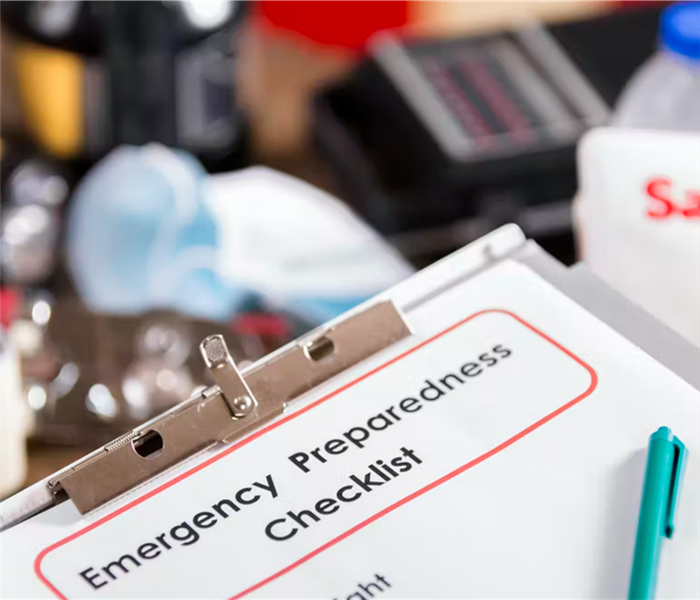 A checklist of items that may be necessary and helpful during storm cleanup can help get you prepared ahead of time.
A checklist of items that may be necessary and helpful during storm cleanup can help get you prepared ahead of time.
In the aftermath of a storm, whether from a thunderstorm or hurricane, you need to be prepared for cleanup. Cleanup can take days and should start as soon as the storm begins. The following is a checklist of items that may be necessary and helpful during cleanup: paper towels, garbage bags, tarp or plastic sheeting, shovels and rakes, and rubber gloves to protect your hands from bacteria in trash piles since they may not wash your hands or use gloves when cleaning up. Many areas will require you to drain standing water and empty couches at the local fire department. If there are items determined to be hazardous by local officials, they will be disposed of.
During cleanup, you should wear protective clothing, including rubber boots. You could get injured or cut if you step on a sharp piece of wood or glass. If you have questions about what to do with certain items after the storm, contact your local health department or other authorities as necessary. Temporary power generators can help if your electricity is off for an extended period after a storm.
Steps To Cleanup After A Storm Flood
- If you have a generator, have it charged & ready to go after a storm. *If you don't have a generator, charge or buy one immediately.*
- Get shovels/ rakes, and do not try to haul water with hand tools. It can cause damage to your materials and equipment.
- Do not use gas-powered tools after the storm except for generators in case of a power outage.
- Storm drains should be swamped with heavy debris. It is best not to throw these into dumpsters or on the curb unless it is a trash bag.
- If you cannot lift a large item, such as a container, do not put it in your car. Call the city office to request a pickup.
- Bulk items that are heavy, such as refrigerators and furniture, should be wrapped in plastic sheeting and placed in the bed of your car.
- If you have standing water, drain it immediately. If your house is damaged, call the city office. If there is no place to drain the water right away, place small pieces of wood underneath a hazardous object and wait until the water has settled; then remove it.
- Trees blown over by strong winds may become hazardous because they may have broken branches or other parts that could come off and possibly harm someone.
- If you remove the carpet, use a duct cleaning machine to avoid the spread of mold.
- Do not use gas-powered machines or grills for cooking during cleanup.
- Do not throw fish in the grass or put them in bins at the curb or dumpster; it attracts other animals that could spread diseases.
Predictions for the Upcoming 2022 Hurricane Season
5/19/2022 (Permalink)
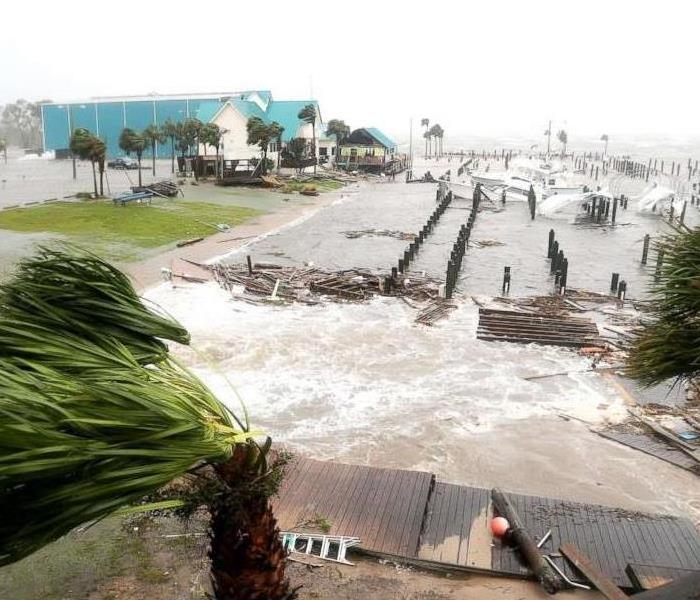 Hurricane Michael was the last major storm to hit Florida and devastated the panhandle.
Hurricane Michael was the last major storm to hit Florida and devastated the panhandle.
Florida hasn't experienced a major hurricane since 2018, but forecasters are predicting a more active hurricane season for 2022. This could mean an increased risk of Florida experiencing a major hurricane for the first time in more than three years.
For the 2022 hurricane season, forecasters say that there is a more than 44 percent chance that Florida will be impacted by a major hurricane during the 2022 season. This prediction was made by Colorado State University's Tropical Meteorology Project.
During a typical hurricane season, the same forecasters at Colorado State offer a 29 percent chance that Florida will be struck by a major hurricane. To be exact, the university's predictions say a major hurricane could strike within fifty miles of Florida.
The lead researcher at CSU, Phil Klotzback, says, "In the last couple of years, Florida has generally gotten 'lucky.'"
Klotzbach says that Florida has experienced some impacts from major storms in the last few years, but these impacts haven't been direct ones. Klotzbach points out Eta in 2020 as well as Elsa, Fred and Mindy. "But they weren't huge impacts. Obviously, Louisiana has been the state that has been kind of ground zero in the last two years."
CSU ranks a major hurricane as one that has been categorized as a Category 3, 4, or 5. These storms contain winds of at least 111 mph or higher.
The hurricane season begins on June 1 and ends on November 30.
The research team at Colorado State University has predicted seven consecutive years of an above-average hurricane season, beginning in 2015. This year's forecast holds that at least nineteen named storms will develop, four of these will be major hurricanes and nine storms will upgrade to hurricane status (this means winds reach 74 mph or higher).
During an average hurricane season, the odds of a named storm impacting Florida is 86 percent; however, this year, CSU is predicting that there is a 96 percent chance that a named storm will hit Florida. The odds of a hurricane (a named storm with at least 74 mph winds) will impact Florida is 75 percent; on an average, the chances are only 56 percent.
Researchers at CSU predict that a major hurricane will impact the East Coast, including Florida, during the 2022 hurricane season at a 47 percent probability. Typically, this is only a 31 percent chance. The odds that a major hurricane (Category 3 - 5 with winds above 111 mph) will impact states along the Gulf Coast (from the Florida Panhandle to Texas) is 46 percent this year. On average, that chance is only about thirty percent.
NOAA's Climate Prediction Center has announced that they believe conditions are favorable for at least fourteen named storms during 2022 and seven hurricanes. NOAA predicts there will be three major hurricanes in the Atlantic this year.
What to Expect at a Central FL Hurricane Shelter
6/22/2021 (Permalink)
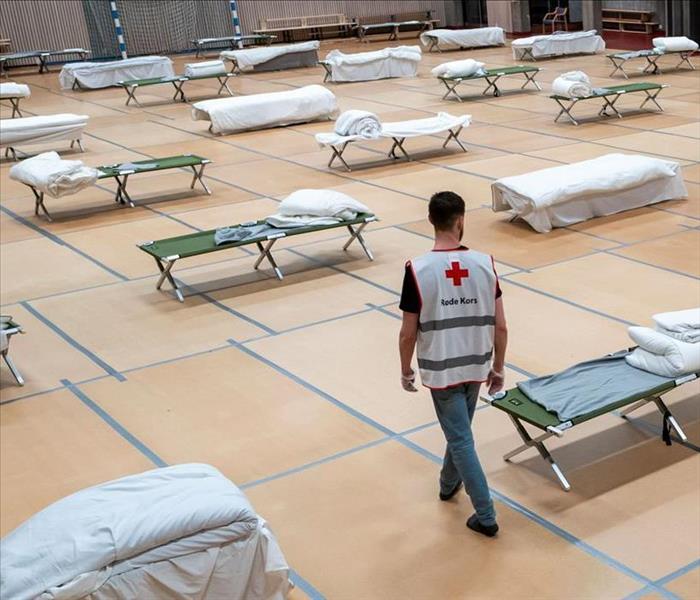 Retreating to a hurricane shelter in the event of a hurricane be a safe choice but also confusing. Knowing what to bring and expect can help.
Retreating to a hurricane shelter in the event of a hurricane be a safe choice but also confusing. Knowing what to bring and expect can help.
Going to a Shelter for Safety in the Event of a Hurricane
Hurricanes can be deadly and destructive. Hurricane winds and waves can severely damage and destroy homes, produce heavy rain and flooding, and can flood whole communities. Hurricanes produce dangerous rip currents along the Florida and Georgia coasts and bring up to 5-foot storm surges. In general, pay attention to your neighbors' safety because everyone's needs may be different.
- What are the signs of a hurricane? Sea-level water becomes higher than normal, and the winds start to blow.
- What should people do during a hurricane? Be aware of the emergency, and make sure you are fully informed. Listen to radio and television for announcements.
- During a hurricane, if you are inside, get in a doorway or a closet away from doors and windows. Stay away from windows.
- If you are outside and in your car, buckle your seatbelt and secure your hood. Pullover as far as possible from buildings and trees.
- If you're in a boat, get out. Don't tie yourself down or put anything around your waist that might get caught in the lines of a boat.
- Remember: There is a life-threatening risk to you, your family, and your neighbors during a hurricane.
When it comes to water safety, the first and foremost rule is to know how to swim and do it well. You should have a swimming life vest at all times, and when possible, you should also have a waterproof one. The next most important safety step is to know how to float if you get into trouble. You need to remain calm and think. If you are calm, you will be better able to swim to safety. Also, make sure to have a first aid kit and any necessary medications with you, just in case you have to cut a limb or are otherwise injured. You should also remember that a life jacket or life ring is necessary if you are stuck in a boat. All boats should be appropriately stowed and anchored well.
How to be prepared for a hurricane
Put together a hurricane plan. Make a family communications plan: purchase flashlights and extra batteries. Have supplies that can serve you for at least three days. Don't forget an emergency kit. Remember, no one knows when a hurricane will strike. Make a plan to stock the kit with the right items and store it in a safe place—store three days' worth of water, food, medications, and pet food.
Among the ideal methods to prepare for a hurricane is to buy or build a safe boat. Then, practice navigating. Once you know how to navigate your boat in a hurricane, you'll be less likely to get lost. If you live near the coast, you'll need to add your stock. You should have supplies on hand, including:
- Bottled water
- nonperishable food
- baby food
- bath toys
- flashlights
- money
Don't forget the pets! Bring them with you to the shelter or keep them at home if you live in an evacuation zone.
Winding Up
Hurricanes are very dangerous, especially since they are centered in warm water. They are also often fueled by an abundance of warm water. There are many of them in the Atlantic basin each year. As you can see, a hurricane can easily devastate a community. What other disaster preparation strategies would you add to this list? Do you know other tips for hurricane survival?
Hurricane shelter options for central Florida – Volusia County, Seminole County, Orange County, and Osceola County.
- Stop the power – Do not touch any power lines. Keep clear of anything touching a downed power line. Avoid driving into flooded roadways.
- Always keep your pets at home during a hurricane because strong winds will blow things around. If you decide to leave your home for shelter, make sure to bring your pets with you!
- When faced with an emergency, be prepared to act quickly and decisively.
- Stay away from windows and try to avoid the corded phone is damaged during the storm. A battery-operated radio will provide vital information and will help people to know what to do.
- If you've any medical challenges, don't drive. Instead, walk to a shelter or a hospital. Do not drink alcohol while drinking water.
- Listen for evacuation notices and calls from your local emergency managers.
- Listen for the sounds of the house as it struggles to withstand the wind and rain and falling trees.
- Use a room of sturdy construction. If you have a safe room in your house, then make sure to put this room ready. Ensure you have enough blankets, pillows, and other items.
- Always carry your emergency supply kit. Use candles as a backup power source. Buy a can opener.
- Make sure you have up-to-date emergency supplies at your homes, such as candles, nonperishable food, and a battery-operated radio.
- Do not store your generator in your home because it can overheat. Don't work on generators indoors.
- Please make a list of important family members and have them updated. Be prepared to evacuate quickly.
Let the storm pass and begin to rebuild. Ensure you don't get overwhelmed by the emotional aspect. Even if you do lose everything, you will survive and will be much stronger and more resilient. To perform storm damage service consider SERVPRO of University, SE Orlando.
Damage Caused by Hurricanes
6/22/2021 (Permalink)
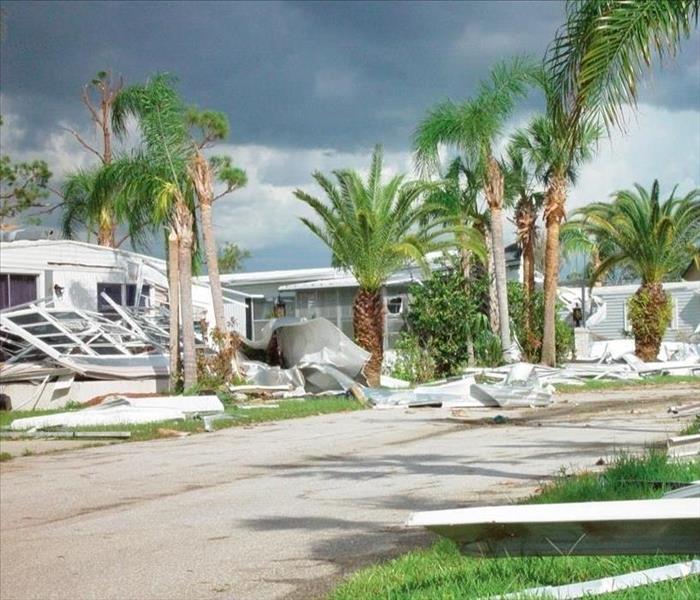 The potential damage left in the aftermath of a hurricane can be devastating in more ways than one.
The potential damage left in the aftermath of a hurricane can be devastating in more ways than one.
Storms such as hurricanes are some of the strongest on the planet. They can cause a lot of damage and destruction depending on where they make landfall with strong winds, heavy rains, high waves, and storm surges.
This article will talk about what types of property damage hurricanes can cause and how you can prepare for them so your home and family will be safe.
Property Damage Due to Hurricanes
One of the most common types of damage is when a hurricane increases water levels in rivers and lakes to cause flooding. This phenomenon can also be caused by heavy rains preceding or following landfall and storm surges from hurricanes that make landfall near waterways like the Gulf Coast.
Damage to property that typically occurs during floods includes things such as bridges getting washed out, dams bursting (resulting in dangerous floodwaters), and homes being filled with water until they're either swept away downstream or destroyed entirely.
Another type of property damage that often happens due to high winds is uprooting trees, knocking them over on buildings and cars below while also causing power lines to come down across streets, making it impossible for people to get around without serious risk!
Extreme flooding due to storm surge from the hurricane can cause major property damage. Hurricane winds may blow down power lines, causing a loss of utilities for days or weeks in some cases. Huge trees and branches will be uprooted with these strong wind gusts and may knock out windows or even fall on homes nearby.
Different types of property damage can be caused by hurricanes:
Structural Damage
This is when a hurricane wreaks havoc on the physical structure of your home. It might blow off roofs, shatter windows and break down walls. But with having storm protection like plywood or shutters, you could reduce this risk.
Hardship Damages
These are costs incurred after Hurricane Maria in Puerto Rico because people don't have access to food, water potable water filters for their homes, or fuel for their cars.
Financial Damages
If a hurricane damaged your home, you might have to pay costly repairs and renovations on top of the price of living in temporary housing while yours is being repaired. The long-term effects could include decreased property values with no insurance policy available because it's not covered under an older one or if there are other issues like foreclosure after Hurricane Katrina hit New Orleans.
Losses Due To Flooding And High Winds
A hurricane can also cause flooding, which will increase water damage costs and structural damages to homes from high winds that tear off metal roof panels and blow out windows.
Damage to the Roof of a Property
Hurricanes can cause major damage to the roof of a property, which is not only expensive for repairs but also inconvenient as it will make living in your home more difficult.
Water Damage
Suppose you have water running into or under your house from rain and seeping through windows because high winds blew them out during a hurricane. In that case, there's an increased likelihood that mold may form, which could lead to a variety of health effects.
Some other risks associated with this type of damage, include structural issues caused when pipes freeze and burst due to cold weather coming inside your home after winter storm conditions return. The risk continues even longer than the duration of one season, though, since many people don't dry their houses completely before turning on their central heating system.
If you have no power, your refrigerator and freezer will stop working properly, which could lead to food spoiling as well as an increased risk of bacteria growth in the fridge or freezer if it's not cold enough.
Other risks with this type of water damage include household goods getting wet, including books and photos that may be irreplaceable. There are also some safety concerns because there could be hidden electrical hazards such as exposed wiring inside walls where insulation is pulled away from them during the storm.
Water damage can also cause mold spores to grow after flooding sewage backups into living spaces due to a broken sewer line under the house, caused by debris being washed down residential streets into drainage culverts when the storm drains are overwhelmed.
In Conclusion
Hurricanes can cause a tremendous amount of damage. It is essential to protect yourself, your family, and your property from natural disasters.
Minimizing Damage To Your Home Before A Storm
6/1/2021 (Permalink)
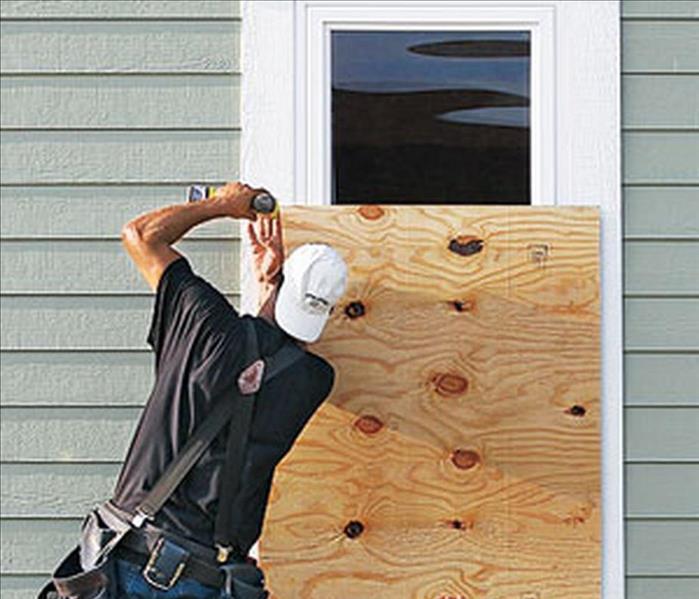 Hurricane impact windows add protection in the event of a storm. If there is an impending storm you can also board your windows temporarily.
Hurricane impact windows add protection in the event of a storm. If there is an impending storm you can also board your windows temporarily.
Living on a coast with water frontage is a dream of most homeowners. There's nothing like enjoying a cup of coffee or a glass of wine while watching the surf gently caress the shore. The cool breezes blowing off the water give the house an atmosphere lots of homeowners pay a lot of money to have.
The trouble with coastal living is that for a few months out of the year, those breezes turn lethal. The winds surrounding a storm complex throw anything loose against a house, break windows, tear off the roof, and repark your car in strange places.
Storms may be the price we pay for coastal living, but it doesn't have to be too damaging for the checkbook. Securing loose things, trimming back trees, and bringing indoors what could easily become a projectile is a simple and effective way of prepping a house for storms with high-velocity winds. Here's how.
1. Bring In Loose Lawn Furnishings And Toys
Patio furniture, swing sets, climbing toys, grills, trash cans, and planters all become projectiles in hurricane-force winds. Bring them into the basement or garage. Secure your fencing, mailbox, and deck boards as well. The winds can get under things, ripping them out of the ground, and make a mess of them. Hire a professional to help you secure these things well before the storm season.
2. Double-Check Your Trees And Shrubbery
Dead tree branches frequently are ripped from trees and hurled against houses. Have a tree specialist examine your trees and shrubs for dead matter and remove them. If tree limbs are too close to the roof, have them trimmed back. If trees are wrapped around power lines, have them trimmed back. The city or county usually takes care of this, but time is of the essence here. Get it done for the safety of your home.
3. Secure The Roof
The technology built into today's roofing materials takes into account hurricane-force winds. They're usually good for winds up to 140 mph. The best roof materials are metal roofs of tin, zinc, copper, steel, or aluminum. They're a little more expensive, but they last up to 50 or more years. Asphalt shingles only last about ten years before they need replacement. Architectural shingles are made to last 20 to 30 years and to resist winds of up to 130 mph. Before the next storm season, look into replacing the roof.
4. Secure The Windows
Considering the billions of dollars of damages done by recent storms, coastal governments now require homes to have hurricane-impact windows. You might want to upgrade if you live in a home built before this building code was enacted.
Hurricane-impact windows offer heavier, break-resistant frames. They also resist projectiles hurled by 150 mph winds. They protect against water introduction as well as reducing your insurance premiums. You'll want windows with a design pressure rating of 50, which stand up well to hurricane-force winds of 200 mph.
There are different types of shutters that are effective against high-velocity winds. Hurricane shutters are hinged and close on the outside to protect windows. Accordion shutters and Bahama shutters are a little more expensive, but they're all effective protection for your windows.
5. Reinforce Your Doors
Air pressure is the bane of a house. Since your garage door is the largest of your house's doors, it's especially vulnerable to hurricane winds. If it isn't reinforced, it can be snatched off. Air pressure then builds up. It can possibly blow the roof off the house.
To guard against this possibility, install a garage door that's hurricane-resistant. They have reinforcements of steel, springs, and more hardware to strengthen the door. If hurricane garage doors aren't in the budget, you can still prep your garage door using steel panels and storm braces for extra strength.
For the front, back, and basement doors leading outside, fiberglass has been tested for hurricane-force winds. They tend to keep water out very well. They're not cheap, but $150 can get you a basic fiberglass door resistant to wind and rain.
Tip: Did you know that closing all the doors in the house including the garage door reduces air pressure by 30 percent? This gives the roof a better chance of sticking around.
6. Secure The HVAC Unit
One thing you don't want crashing into your house is your HVAC unit. Prep it before a storm by strapping it down. Use a cage or trap around the unit to prevent blowing debris from damaging it. Clear foliage around the unit to prevent clogging the fins. Hire an HVAC professional to service the unit before the storm. Buy a backup generator in case of a power outage.
During the storm, turn off the circuit breaker to the unit to prevent damage. Following the storm, have an HVAC professional check the unit over to make sure it's safe to use. Do not, repeat, do not turn on the unit if there's standing water around it.
7. Important Things To Heed
Make sure your gutters are cleaned before storm season rolls around. Ensure the downspouts are clear and pointed away from the foundation.
Make an inventory of your home's belongings, both inside and outside. Take pictures of the property before the storm season arrives. This will make any insurance claims a little easier on everyone.
If you can fit them in, put your cars in the garage to protect them from damage.
Build a survival kit of medical supplies, a hand-crank radio and flashlight for remaining informed, and enough food and water per person for at least five days.
2021 Atlantic Hurricane Season Safety
6/1/2021 (Permalink)
 The best way to ensure Atlantic hurricane season safety is by making sure that you know how to prepare for hurricanes in advance.
The best way to ensure Atlantic hurricane season safety is by making sure that you know how to prepare for hurricanes in advance.
The Atlantic hurricane season officially began June 1st and ends November 30th. Storms can form any time of year, though, so it's always important to be prepared. During the active season, however, it's critical. Your and your family's safety relies on being prepared for a tropical storm or hurricane before it's even formed. And there is plenty you can do to be safe during the 2021 Atlantic hurricane season.
Prepare even if you're not in the direct path
Whether you're new to the area or you've simply never been in the direct path of the storm there, you always need to prepare for the season. Unlike tornadoes, tropical storms and hurricanes do form early and therefore allow time to prepare. But they're also unpredictable and can shift their projected path unexpectedly and quickly. Even if you think you're not in danger, it's a good idea to have everything ready just in case.
Stock up on food and water
This is often said, but it's usually when a storm is expected to or is approaching. However, once a storm is on the way, it may be too late. You might find that the items you need most are out of stock because everyone else needed them too. Instead, stock up early in the season (or even before) and do it slowly over a period of weeks. Remember you need at least a gallon of water per person per day, including pets. When it's especially hot or someone is pregnant, more water is better. Have enough food and water to last a minimum of three days up to at least two weeks.
Secure your home
Protecting your home is essential to your safety and that of everyone else who lives around you. Storm-force winds can pick up even heavy objects and carry them longer distances than you might think. Before a storm, go outside and move anything you usually leave outside indoors: patio furniture, umbrellas, children's toys, bikes, etc. Take down trampolines and swingset if possible. Put hurricane shutters or plywood over your windows and reinforce garage doors. If you can, strap or clip your roof to the home's structure. If there are repairs that need to be made to keep the house safe, get those repairs made before a storm is approaching.
Prep a "go bag" with essentials & non-replaceable items
Whether you plan to evacuate or plan to try to ride out the storm at home, you should prep a "go bag" with essentials and non-replaceable items. These would be things like:
- prescription medications
- insurance policies (and photos or videos of your home and contents)
- legal documents (birth certificates, Social Security cards, marriage licenses, divorce & custody documents, medical records, etc.)
- important family photos
- clothing
- treasured toys or mementos
- backups of computer and tablet contents (and the devices themselves, when possible)
Prepare a "go bag" for every member of the family, including pets. This ensures that whether you evacuate as planned or need to go unexpectedly, you have the most important things along with your family.
Be prepared to evacuate
Many seasoned Atlantic area residents choose to stay in their homes and wait the storm out. They know the dangers and they're okay with them. But even when you think you want to ride it out at home, you should still be prepared to evacuate. A tropical storm or hurricane can change paths or intensity at a moment's notice. If your area sustains more damage than you expect, or your own home is damaged, you may need to get out immediately. Know the routes you can take, the locations of various shelters, and places you can stay outside the affected area.
Turn down the fridge & freezer
If the power goes out, your food will stay chilled for several hours - longer with a generator. If you turn down the temperature of your fridge and freezer, you can extend that time even more. While you have no control over when the power is restored, this gives you more time to use your grill or gas-operated cooking devices to cook and eat your refrigerated and frozen foods before they go bad. If you're evacuating, freeze a cup of water and put a quarter on top. When you return, if the quarter isn't still on top of the water, toss everything.
Fill your gas tank
As a rule, it's best to keep your gas tank as full as possible during hurricane season. As a storm approaches, many areas in its path will start to see fuel shortages that cause long lines and empty pumps. If your tank isn't full and you hear a storm is brewing, head to the gas station and fill up.
Carry cash
After the storm has passed, the power might be out for days or even weeks. But you'll start to need things again. And if the power is out, your debit and credit cards will be useless. So will your insurance cards. If you need food, water, medication, or a visit to the doctor, you'll need to pay cash. You might get reimbursed by your insurance later for medication or doctor visits, but you'll likely be required to pay up by the provider initially.
While the historic level of storm activity in 2020 is not expected to be repeated, 2021 is still forecast to be an above-average year. Safety is paramount and that requires preparation. Get ready now so you can be safe later.
2021 Atlantic Hurricane Season Forecast
5/6/2021 (Permalink)
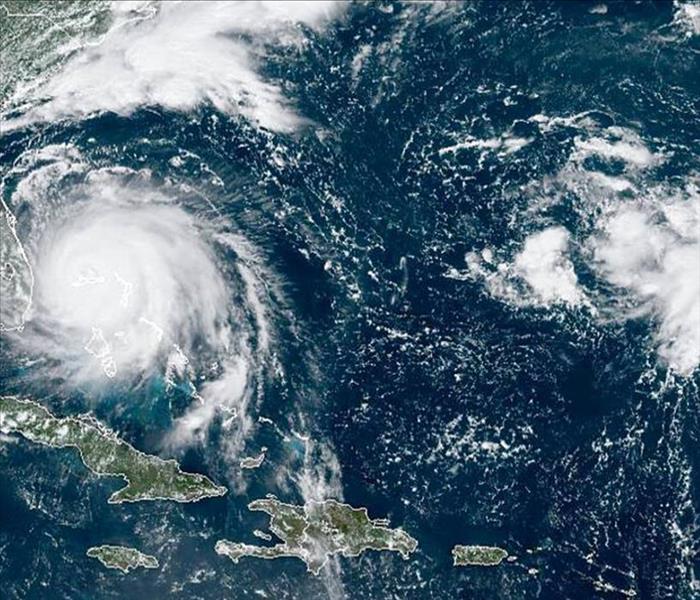 According to a forecast released by Colorado State University, we are unlikely to have a passive hurricane season this year.
According to a forecast released by Colorado State University, we are unlikely to have a passive hurricane season this year.
After everything that’s happened over the past year, we may feel like we deserve a quiet hurricane season.
“We are forecasting a well-above-average hurricane season,” said Phil Klotzbach, research scientist for Colorado State University’s Tropical Meteorology Project, in a presentation Thursday to the National Tropical Weather Conference.
The forecast cited two major reasons to expect a busy season. This year is unlikely to experience an El Niño, the warming of part of the Pacific Ocean that produces high-level winds over the Atlantic that can tear up storm systems before they can form hurricanes.
The forecast, if it turns out to be accurate, would not be as bad as last year’s record-breaking season, which generated 30 named storms, including 13 hurricanes, exhausting the list of hurricane names selected for that year.
The prediction released last month by AccuWeather, the private forecasting service, which said to expect seven to 10 hurricane, with three to five reaching major strength.
Early season forecasts have varied in accuracy. Last year Colorado State’s April forecast called for eight hurricanes for a season that would produce 13. But the previous year, the April forecast was pretty close, predicting five hurricanes for a season that would produce six. And the year before that, the prediction called for seven hurricanes, and the season produced eight.
Forecast released closer to the season’s start date tend to be the most accurate. Colorado State and other forecasters will be releasing updated outlooks, including ones before the season’s peak begins in August.
Hurricane Names for the 2021 Season
5/6/2021 (Permalink)
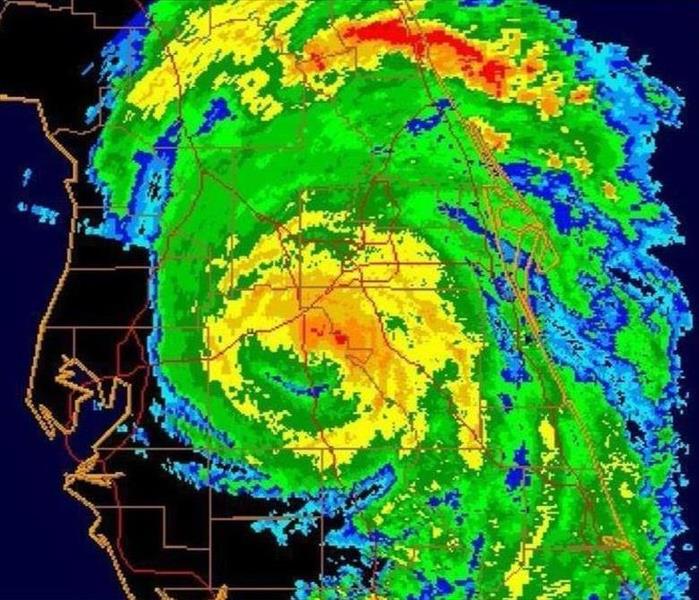 Some hurricane names are remembered far longer such as Hurricane Charlie which caused significant damage in Florida in 2004.
Some hurricane names are remembered far longer such as Hurricane Charlie which caused significant damage in Florida in 2004.
The start of our hurricane season is under two months away. It's hard to believe the season is approaching so quickly, but now is a good time to review your hurricane plan.
What You Need To Know
- List of names for a hurricane season rotates every six years
- This list was last used in 2015
- Elsa and Julian are new to the list of names
- The World Meteorological Organization selects which names are used
There are many people moving to hurricane-prone locations, particularly from non-tropical locations where hurricane seasons are a new concept.
Here’s what you should consider as we approach hurricane season:
- Know your evacuation zone
- Create an emergency supplies kit
- Have a list of important documents and medications
- Think about finances- have extra cash available in the event of power outages
- Write your hurricane plan and review with the family
- Review your insurance policies
- Strengthen your home
Hurricane season runs from June 1 through November 30. Remember, storms can form during the “off-season.” It happened just last year when Tropical Storm Arthur and Tropical Storm Bertha during the month of May.
This year is likely to be busier than average, but remember, it takes only one storm to make a hurricane season bad for someone.
The names for the 2021 hurricane season are below.
Did your name make this list?
- Ana
- Bill
- Claudette
- Danny
- Elsa
- Fred
- Grace
- Henri
- Ida
- Julian
- Kate
- Larry
- Mindy
- Nicholas
- Odette
- Peter
- Rose
- Sam
- Teresa
- Victor
- Wanda
There are six lists of names for the Atlantic hurricane season that rotate out. This means this list was used six years ago in 2015 and will be used again in the year 2027.
The only names that don't recycle with the list in the future are those that become retired. This year, the names Elsa and Julian are new to this list after Tropical Storm Erika and Hurricane Joaquin were retired in 2015.
Tropical Storm Erika was a 50 mph tropical storm affecting the Antilles, especially Dominica. The flooding was the notable component of this storm after over 30 inches of rain fell. There were 31 fatalities from Tropical Storm Erika.
Hurricane Joaquin led to 34 deaths in 2015 after slamming into the Bahamas as a Category 4 hurricane.
Where do these names come from?
The World Meteorological Organization is the agency responsible for retiring storm names and coming up with names for the season lists. New for this year is the naming convention of tropical cyclones after the original list of names is used up.
Historically, storms would be named after Greek letters, but that will not be the case moving forward.





 24/7 Emergency Service
24/7 Emergency Service






